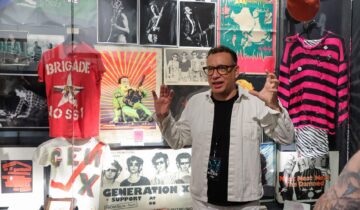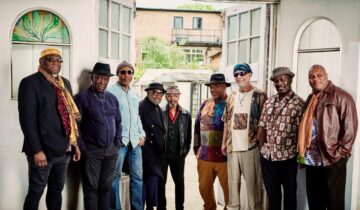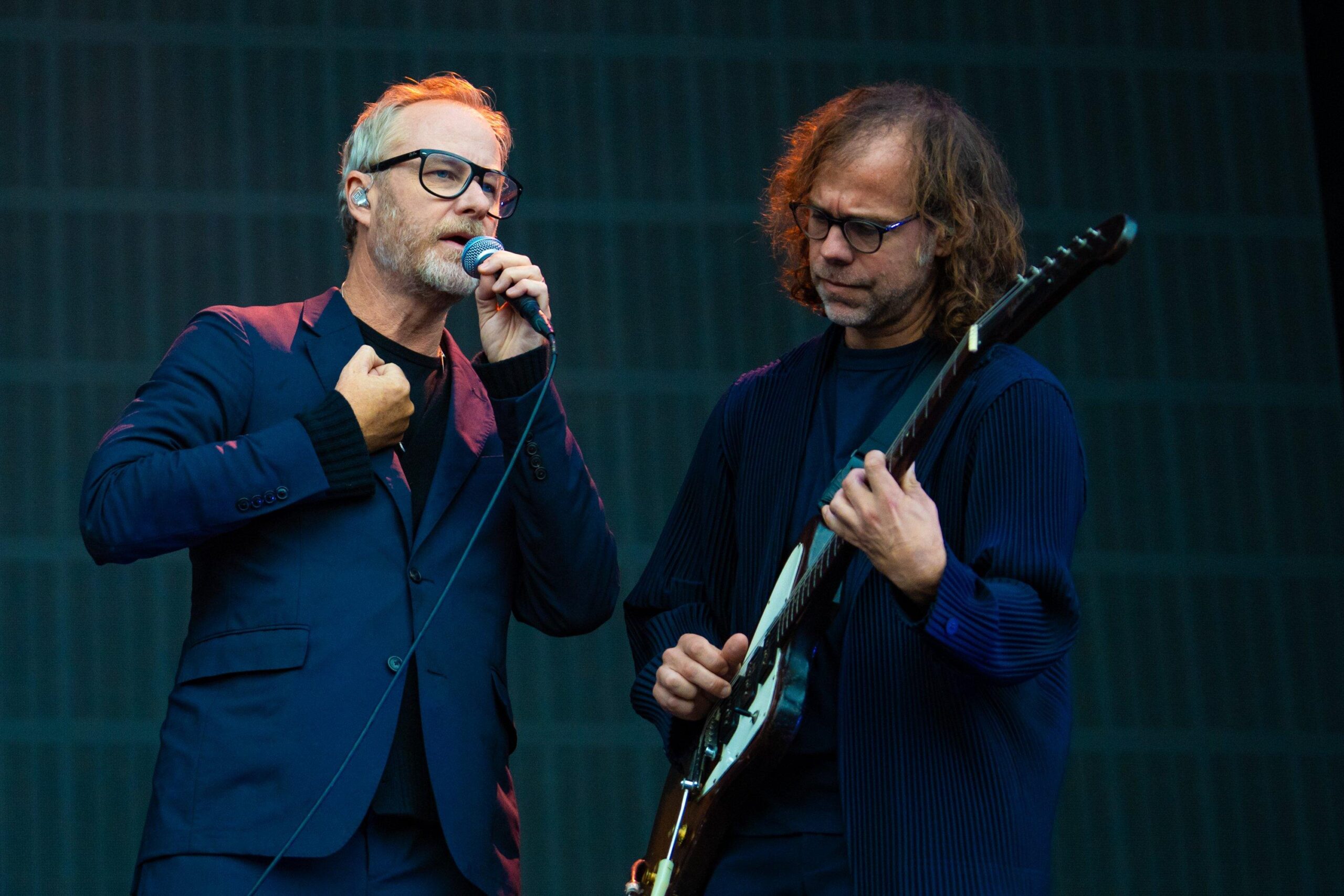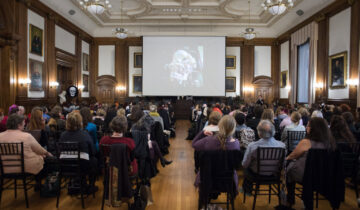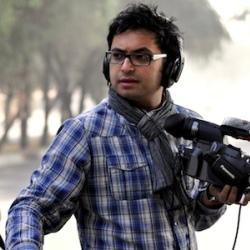 “Slackistan”, a debut feature from Hammad Khan, follows the uneventful lives of a group of aimless, privileged 20-somethings. They hang out, wear T-shirts, smoke, listen to music, get bored, drive around, and talk about stuff. The film’s story—it would be tough to call it a plot—could unfold in any number of places around the world. Khan’s setting is Islamabad, Pakistan.
“Slackistan”, a debut feature from Hammad Khan, follows the uneventful lives of a group of aimless, privileged 20-somethings. They hang out, wear T-shirts, smoke, listen to music, get bored, drive around, and talk about stuff. The film’s story—it would be tough to call it a plot—could unfold in any number of places around the world. Khan’s setting is Islamabad, Pakistan.
There is hardly a mention of war or the Taliban, although the occasional news update flashes across television screens in a few scenes. This is not by accident. Khan, who is 35, was born in Pakistan and grew up in London, wanted to make a film about the Islamabad that he and other young people know today: a relaxed, laid-back city that “always sleeps”.
First released in 2009, the film has screened in Abu Dhabi, Goa, London, New York, and San Francisco, but Pakistan officials recently banned the film. Its Central Board of Film Censors has taken issue with dialogue references to the Taliban and Osama bin Laden, the use of the word “lesbian”, and scenes in which the film’s characters drink alcohol and curse in English and Urdu.
More Intelligent Life asked Hammad Khan about his film after a recent screening at London’s Institute of Contemporary Arts. The full interview is at INTELLIGENT LIFE and also continues after the jump
To Western audiences who have seen films like Richard Linklater’s “Slacker”, the story of your film might feel somewhat familiar. Were you influenced by other slacker films?
“Slacker” is a very different film from “Slackistan”. Apart from an opening nod to the ‘youth walking and talking’ style of that film, my film is far more traditional and story-driven. “Slacker” is in a league of its own and was a pioneering, near-experimental film. Perhaps better comparisons could be drawn with Richard Linklater’s other youth movie, “Dazed & Confused” or Whit Stillman’s “Metropolitan”, about the upper-class youth in New York.
Your film was recently banned in Pakistan. Why do you think that happened, and what do you plan to do about it?
Good old-fashioned arbitrary state censorship still exists. I feel disappointed and angered by their decision. It’s one rule for Hollywood/Bollywood films playing uncut week in, week out, and a totally different one for home-grown independent films. They have shown themselves to be enemies of progressive film culture and apologists for the extremist elements of society. Next steps, we go underground and try to show the film unconventionally and under the radar.
How accurate is your depiction of Islamabad? Why do you think it is the city that “always sleeps”?
The depiction of Islamabad is about as accurate as I know it. The youth in the movie are real, the houses, the cars, the hangouts and the daily conversations and issues. In a sense, all of this was happening and I tried to point a camera at it, rather than skew reality and package it for Western audiences.
How have people responded to your film?
The film has received warm responses from the largely South Asian diaspora audiences, mostly from the younger folk. The unexpected responses have come from mainstream British audiences and commentators, who don’t seem interested in this world or “a Pakistan just like us.” Some don’t even acknowledge that it is real, which is a bit ignorant. But, given the times we are in, the gulf of understanding between cultures is widening rather than coming closer. I thought perhaps “Slackistan” would confound people enough to wake up and question their own perceptions of Pakistan. Sadly, it seems more people than I thought actually want their prejudices about the world reinforced right now, rather than challenged.
You include Muslim punk bands in the soundtrack. Has Muslim punk had a big impact on young people in Islamabad?
The punk, indie, hip-hop, pop are all from bands that either the actors were part of, or were friends of mine. The young people of Islamabad are even a little more Westernised than in most parts of the country and they do like their guitars and their drums.
You include a scene in which the main character walks into a poor, segregated Christian community. How common is it for Christian communities in Islamabad to live in such isolated areas?
These segregated colonies are in each main district/sector. They are basically slums sandwiched between mansions and shiny buildings. The lives of these minorities are very difficult; they do the most menial jobs and have no respect. In fact, they are constantly living in fear and under threat from the larger population. Recently the issue of the country’s blasphemy laws has become a national debate after the brutal assassination of the Governor of Punjab by his own guard. He was shot 27 times in one of the most peaceful markets in Islamabad, where we shot a lot of “Slackistan”, only because he spoke out on the blasphemy law and defended a Christian woman charged with this law.
How do you think Islamabad has changed in the past five or ten years?
It used to be a safer, more serene place. Beautiful hills, quiet and clean streets. Some people say it’s bland, but historically it used to be where foreign diplomats would hate to leave. Nowadays, there is far more security on the ground. Moving around isn’t as free as it used to be. [But] there are beautiful places to walk and trek. There is nothing quite like the serene stillness of a sunny winter’s afternoon in Islamabad.
What’s been your experience in Pakistan?
I was born in Pakistan but my father was a political activist who fled to the UK in exile during the years of martial law. I returned to Pakistan sporadically in my teens and early twenties. But I am, all said and done, a true Londoner.
Shahbaz Shigri, who plays the male lead in the film (Hasan), said in an interview with the Guardian that the films that come out of Pakistan are either religious or political. Why do you think that is?
Well there aren’t many films to start off with. All credit is due to filmmakers who can tell indigenous stories and get them out there. The problem isn’t the filmmaker, it is the myopic, rigid approach to Pakistan that exists in Western media and culture. I have found some of it to be so narrow and agenda-driven that it has reached absurd levels. The film has been criticised by some intellectuals for not dealing with the Taliban or showing the outside world. That kind of reaction is either extremely arrogant or just mentally opaque. How can a window on the sixth-largest population in the world be reduced to a little peephole, beyond which there must be a man with a beard and a gun? This might go some way in answering the question why films from Pakistan need to be political or religious. Let it be said, slackers outnumber terrorists in Pakistan by a big margin!
For some of the characters in the film, the best option is to leave Islamabad for education or other opportunities elsewhere.
It felt natural to include that in the story, because these kids do have the money and visas to escape to New York or London if they can’t handle it back home. It’s an impulse because nothing works in Pakistan and everything seems to be available in the US and Europe. Even if you’re rich, you can’t escape the reality that everything is broken around you. The question then becomes do you escape this reality or confront it?
Why did you want to make this film?
This was life under our noses and I thought it would be interesting to capture this set of young people. They are the future of the country and they seem lost. I also wanted to paint a picture of the city that I spent some years in with some affection.
Do you consider yourself to be a slacker?
I don’t consider myself a “slacker” in the way I have portrayed the twenty-somethings of Islamabad. Perhaps we all go through a period in life where we’re stuck and in between two phases in life. I think it’s a universal thing.
